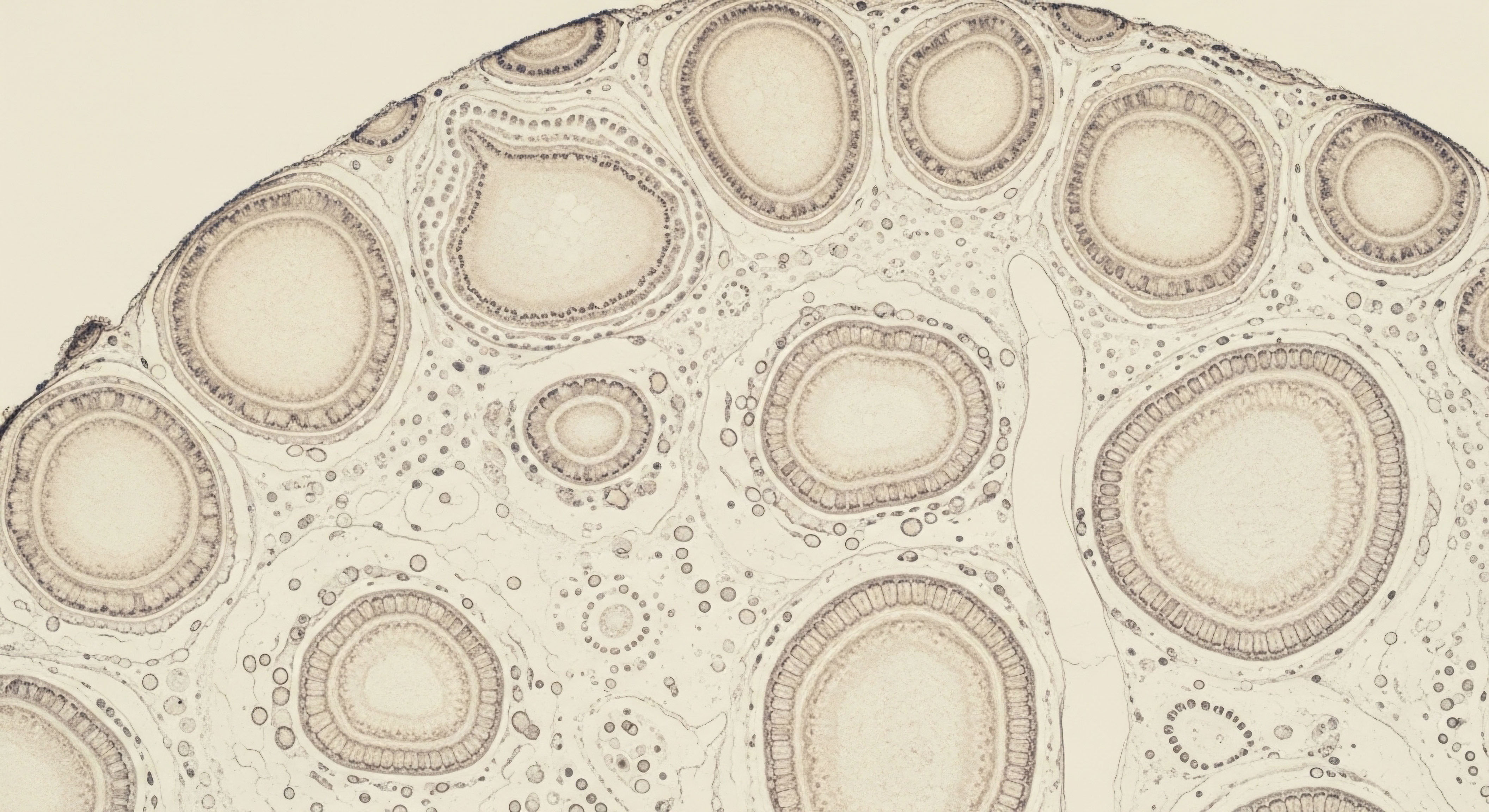

Fundamentals
Experiencing shifts in cognitive clarity, memory recall, or emotional equilibrium can be disorienting, often leaving individuals searching for explanations and solutions. When navigating health protocols that involve altering the body’s intricate hormonal systems, such as anti-androgen use, these cognitive changes can feel particularly unsettling.
It is a deeply personal experience, one that warrants a precise understanding of the underlying biological mechanisms at play. This exploration aims to validate those lived experiences, providing clear, evidence-based explanations of how anti-androgen therapies can influence brain function and what strategies exist to support cognitive vitality.
The body operates as a complex network of communication systems, with hormones serving as vital messengers. These chemical signals orchestrate a vast array of physiological processes, from metabolism and mood to reproductive function and cognitive performance. When the balance of these messengers is intentionally altered, as with anti-androgen protocols, the effects can ripple throughout the entire system, including the brain. Understanding this interconnectedness is the first step toward reclaiming a sense of control and optimizing well-being.
Hormones act as the body’s internal communication network, influencing every system, including the brain’s cognitive functions.

What Are Anti-Androgens and Their Purpose?
Anti-androgens represent a class of therapeutic agents designed to counteract the biological actions of androgens, which are male sex hormones like testosterone and dihydrotestosterone (DHT). These compounds achieve their purpose through various mechanisms, primarily by blocking androgen receptors in target tissues or by inhibiting the production of androgens within the body. Their clinical applications span a range of conditions, including prostate cancer management, certain dermatological conditions, and aspects of gender-affirming care.
For individuals undergoing treatment for prostate cancer, anti-androgen therapy, often termed androgen deprivation therapy (ADT), aims to suppress androgen-driven tumor growth. In other contexts, these agents might address conditions like hirsutism or acne by reducing androgenic effects on the skin. The specific agent chosen and its mechanism of action determine how it interacts with the body’s broader endocrine landscape.

How Androgen Modulation Influences Brain Function
The brain, a highly metabolically active organ, is profoundly sensitive to hormonal fluctuations. Androgens, while primarily recognized for their roles in reproductive physiology, exert significant influence over various aspects of brain health, including mood regulation, cognitive processing, and neuroprotection. Androgen receptors are distributed throughout numerous brain regions, including the hippocampus, amygdala, and prefrontal cortex, areas critical for memory, emotional processing, and executive functions.
When androgen levels are suppressed or their actions are blocked by anti-androgen therapies, the brain’s delicate hormonal equilibrium is disrupted. This alteration can lead to a spectrum of cognitive and mood-related changes. Individuals may report experiences such as a generalized mental fogginess, difficulties with memory recall, reduced processing speed, or shifts in emotional state.
These experiences are not imagined; they are direct consequences of the brain adapting to a new hormonal environment. Research indicates that while some studies show conflicting results, a significant body of evidence points to a potential reduction in cognitive function, mood changes, and even an increased risk of dementia with prolonged anti-androgen use, particularly in older populations.


Intermediate
Understanding the fundamental impact of anti-androgen use on brain function sets the stage for exploring targeted clinical strategies. The goal is not merely to mitigate adverse effects but to actively support the brain’s resilience and optimize its performance amidst altered hormonal signaling. This requires a comprehensive approach that considers the interconnectedness of the endocrine system and its profound influence on neurological well-being.

Optimizing Hormonal Balance for Cognitive Support
While anti-androgen therapy aims to reduce androgenic activity, supporting overall hormonal balance becomes paramount for brain health. This often involves a careful consideration of other endocrine axes and the potential for targeted interventions.

Testosterone Optimization Protocols
In contexts where anti-androgen use is temporary or part of a broader management plan, strategic testosterone optimization protocols can play a supportive role in brain health. For men, Testosterone Replacement Therapy (TRT) typically involves weekly intramuscular injections of Testosterone Cypionate.
This is often combined with Gonadorelin, administered subcutaneously twice weekly, to help maintain natural testosterone production and preserve fertility. Anastrozole, an oral tablet taken twice weekly, may also be included to manage estrogen conversion and reduce potential side effects. Enclomiphene might be added to support luteinizing hormone (LH) and follicle-stimulating hormone (FSH) levels, which are crucial for testicular function.
For women, testosterone optimization protocols are tailored to individual needs, particularly for those experiencing symptoms related to hormonal changes, such as irregular cycles, mood shifts, hot flashes, or reduced libido. Protocols may involve Testosterone Cypionate, typically 10 ∞ 20 units (0.1 ∞ 0.2ml) weekly via subcutaneous injection. Progesterone is prescribed based on menopausal status, playing a vital role in female hormonal equilibrium. Pellet therapy, offering long-acting testosterone, may also be considered, with Anastrozole used when appropriate to manage estrogen levels.
The careful calibration of these hormonal elements aims to create an environment where the brain can function optimally, even when primary androgen signaling is modulated. Testosterone itself exhibits neuroprotective properties, promoting neuronal survival, enhancing synaptic plasticity, and reducing oxidative stress and inflammation within brain tissue. By supporting these fundamental processes, the brain’s resilience can be enhanced.
Strategic hormonal optimization, even during anti-androgen use, can bolster brain resilience by supporting neuronal health and mitigating oxidative stress.

Growth Hormone Peptide Therapy
Beyond traditional hormonal approaches, specific peptide therapies offer a targeted avenue for supporting brain health. Growth hormone-releasing peptides (GHRPs) and growth hormone-releasing hormones (GHRHs) stimulate the body’s natural production of growth hormone, which has wide-ranging systemic benefits, including those for cognitive function.
Key peptides in this category include:
- Sermorelin ∞ A GHRH analog that stimulates the pituitary gland to release growth hormone. It can improve sleep quality, which is critical for cognitive restoration and memory consolidation.
- Ipamorelin / CJC-1295 ∞ These peptides work synergistically to provide a sustained release of growth hormone. Their benefits extend to improved cellular repair, muscle gain, and fat loss, all of which indirectly support brain metabolic health.
- Tesamorelin ∞ Primarily known for reducing visceral fat, it also has demonstrated neuroprotective effects and can improve cognitive function in certain populations.
- Hexarelin ∞ A potent GHRP that can enhance growth hormone secretion, contributing to tissue repair and overall vitality.
- MK-677 ∞ An oral growth hormone secretagogue that can increase growth hormone and IGF-1 levels, supporting neurogenesis and cognitive function.
These peptides can support neurogenesis, the creation of new neurons, and enhance synaptic plasticity, the brain’s ability to form and strengthen connections. They also contribute to better sleep quality and cellular repair, which are foundational for sustained cognitive performance.

Other Targeted Peptides for Brain Support
Specific peptides can address particular aspects of brain health that may be compromised during anti-androgen use:
- PT-141 (Bremelanotide) ∞ While primarily known for its role in sexual health, addressing libido and sexual function can significantly impact mood and overall psychological well-being, which in turn supports cognitive function.
- Pentadeca Arginate (PDA) ∞ This peptide is recognized for its properties in tissue repair, healing, and inflammation modulation. Given that neuroinflammation can contribute to cognitive decline during hormonal shifts, PDA’s anti-inflammatory actions could offer indirect brain support.
The precise application of these peptides, under clinical guidance, represents a sophisticated strategy to bolster the brain’s intrinsic capacity for repair and adaptation.

Nutritional and Lifestyle Pillars for Cognitive Resilience
Beyond pharmacological interventions, foundational lifestyle elements are indispensable for supporting brain health during anti-androgen use. These strategies work synergistically with clinical protocols to create an optimal environment for cognitive function.
| Category | Key Strategies | Brain Health Benefit |
|---|---|---|
| Nutrition | Omega-3 fatty acids, antioxidants, B vitamins, choline-rich foods | Supports neuronal membrane integrity, reduces oxidative stress, aids neurotransmitter synthesis, enhances memory. |
| Physical Activity | Aerobic exercise, strength training | Increases cerebral blood flow, promotes neurogenesis, reduces inflammation, improves mood and sleep. |
| Stress Management | Mindfulness, meditation, deep breathing, adequate sleep | Reduces cortisol’s neurotoxic effects, preserves hippocampal volume, improves cognitive flexibility. |
| Cognitive Engagement | Learning new skills, puzzles, reading | Enhances synaptic plasticity, builds cognitive reserve, maintains neural pathways. |
A diet rich in anti-inflammatory foods, healthy fats, and micronutrients provides the building blocks for optimal brain function. Regular physical activity, particularly aerobic exercise, has been shown to increase cerebral blood flow, promote neurogenesis, and reduce systemic inflammation, all of which directly benefit cognitive health.
Effective stress management techniques, such as mindfulness or meditation, help to mitigate the neurotoxic effects of chronic cortisol exposure, preserving critical brain structures like the hippocampus. Ensuring adequate, restorative sleep is also non-negotiable, as sleep plays a crucial role in memory consolidation and neuronal repair.

Why Is Monitoring and Adjustment Essential?
The dynamic nature of hormonal responses necessitates continuous monitoring and personalized adjustment of any protocol. Regular laboratory assessments provide objective data on hormone levels, metabolic markers, and inflammatory indicators. This data, combined with a careful evaluation of subjective symptoms and cognitive performance, allows for precise recalibration of therapeutic strategies.
The body’s systems are interconnected, and a shift in one area can influence another. A clinical translator uses this comprehensive data to fine-tune interventions, ensuring that the strategies employed are always aligned with the individual’s unique biological landscape and evolving needs.


Academic
To truly comprehend the strategies for supporting brain health during anti-androgen use, one must delve into the intricate molecular and cellular mechanisms that govern the brain’s response to hormonal shifts. This requires an academic lens, examining the deep endocrinology and systems biology that underpin cognitive function and resilience. The brain is not a passive recipient of hormonal signals; it actively processes and responds, and understanding these interactions is key to designing effective interventions.

Androgen Receptor Signaling in the Central Nervous System
Androgens exert their influence on the brain primarily through the androgen receptor (AR), a ligand-activated transcription factor widely distributed throughout the central nervous system. These receptors are found in critical brain regions such as the hippocampus, which is central to learning and memory, and the amygdala, a structure involved in emotional processing and fear responses. The prefrontal cortex, responsible for executive functions like decision-making and working memory, also expresses ARs.
When androgens, such as testosterone or its more potent metabolite dihydrotestosterone (DHT), bind to these receptors, they initiate a cascade of genomic and non-genomic events. Genomic actions involve the AR translocating to the nucleus, binding to specific DNA sequences (androgen response elements), and regulating gene expression.
This regulation impacts the synthesis of proteins vital for neuronal survival, synaptic plasticity, and neurotransmitter synthesis. Non-genomic actions, often more rapid, involve ARs located on cell membranes, influencing intracellular signaling pathways that modulate neuronal excitability and synaptic strength.
Anti-androgen therapies directly interfere with these processes. Some agents act as competitive antagonists, binding to the AR and preventing natural androgens from activating it. Others inhibit enzymes involved in androgen synthesis, leading to a systemic reduction in androgen levels. The consequence is a diminished AR signaling cascade within the brain, which can lead to alterations in neuronal structure, reduced synaptic density, and impaired neurogenesis, particularly in androgen-sensitive regions.

Neurosteroidogenesis and Its Vulnerability
The brain possesses a remarkable capacity for neurosteroidogenesis, meaning it can synthesize its own steroids, including androgens and estrogens, independently of peripheral endocrine glands. This local production provides a crucial layer of neuroprotection and fine-tunes neuronal function. Enzymes like aromatase, which converts testosterone into estradiol, are present in various brain cells, allowing for localized hormonal modulation.
Anti-androgen use can indirectly impact neurosteroidogenesis. While some anti-androgens directly block peripheral androgen production, the brain’s ability to synthesize its own steroids from precursors might be affected if the availability of these precursors is reduced or if the feedback loops regulating their synthesis are disrupted.
This disruption can lead to a localized deficiency of neuroactive steroids, potentially exacerbating cognitive and mood symptoms. For instance, reduced testosterone levels can mean less substrate for local estrogen synthesis in the brain, impacting estrogen’s neuroprotective roles.

Interplay with Neurotransmitter Systems and Neuroinflammation
Androgens significantly influence the balance of key neurotransmitters critical for cognitive function and mood. These include:
- Dopamine ∞ Androgens modulate dopaminergic pathways, which are central to motivation, reward, and executive functions. Altered androgen signaling can affect dopamine synthesis, release, and receptor sensitivity, contributing to symptoms like apathy or reduced drive.
- Serotonin ∞ This neurotransmitter plays a pivotal role in mood regulation, sleep, and anxiety. Androgen deficiency can impact serotonergic system activity, potentially contributing to depressive symptoms or emotional lability.
- GABA (Gamma-aminobutyric acid) ∞ As the primary inhibitory neurotransmitter, GABA is crucial for calming neural activity and maintaining cognitive stability. Androgens can influence GABAergic signaling, and their reduction might contribute to increased anxiety or neuronal hyperexcitability.
Furthermore, hormonal imbalances, including those induced by anti-androgen therapies, can contribute to neuroinflammation and oxidative stress within the brain. These processes involve the activation of glial cells (microglia and astrocytes) and the production of reactive oxygen species, which can damage neurons and impair synaptic function. Androgens typically possess anti-inflammatory and antioxidant properties; therefore, their suppression can leave the brain more vulnerable to these damaging processes.
| Neurotransmitter/Process | Androgen Influence | Potential Impact of Anti-Androgen Use |
|---|---|---|
| Dopamine | Modulates synthesis and receptor sensitivity | Reduced motivation, altered executive function |
| Serotonin | Affects system activity | Mood shifts, increased anxiety |
| GABA | Influences inhibitory signaling | Neuronal hyperexcitability, anxiety |
| Neuroinflammation | Anti-inflammatory properties | Increased glial activation, neuronal damage |
| Oxidative Stress | Antioxidant defense support | Increased reactive oxygen species, cellular damage |
Anti-androgen therapies can disrupt the brain’s delicate neurotransmitter balance and increase vulnerability to neuroinflammation and oxidative stress.

Mitochondrial Function and Hormonal Interdependence
Mitochondria, often called the “powerhouses of the cell,” are central to neuronal energy production and overall brain health. They are highly dynamic organelles, constantly undergoing fusion and fission to adapt to metabolic demands and cellular stressors. Optimal mitochondrial function is essential for synaptic transmission, neurogenesis, and protecting neurons from damage.
Sex hormones, including androgens and estrogens, directly influence mitochondrial metabolism and integrity. They can regulate gene transcription in mitochondrial DNA, impact oxidative phosphorylation, and modulate the production of reactive oxygen species. For example, estradiol has neuroprotective effects by influencing mitochondrial metabolism and reducing oxidative stress. When androgen levels are suppressed, the intricate hormonal regulation of mitochondrial function can be compromised, potentially leading to reduced energy efficiency, increased oxidative damage, and impaired neuronal resilience.
Strategies for supporting brain health during anti-androgen use must therefore consider interventions that bolster mitochondrial health. This includes ensuring adequate nutrient cofactors for mitochondrial function, promoting cellular antioxidant defenses, and supporting metabolic pathways that optimize energy production.

Can Hormonal Recalibration Mitigate Cognitive Impact?
The evidence suggests that maintaining a careful hormonal balance, even when suppressing androgens, can be a strategy for mitigating cognitive impact. For instance, while anti-androgens reduce testosterone, the role of estrogen in the male brain, synthesized from testosterone by aromatase, becomes significant. Estradiol, the primary estrogen, has profound neuroprotective effects, influencing learning, memory, and mood. Therefore, managing estrogen levels appropriately, rather than allowing them to fall excessively, can be a supportive measure.
Post-TRT or fertility-stimulating protocols in men, which include agents like Gonadorelin, Tamoxifen, and Clomid, aim to restore endogenous hormone production. While these are typically used after discontinuing TRT or for fertility, the underlying principle of restoring natural hormonal rhythms and feedback loops is relevant. These agents work on the hypothalamic-pituitary-gonadal (HPG) axis to stimulate the body’s own hormone synthesis, which can contribute to overall systemic and neurological equilibrium.
The overarching principle is to approach hormonal health as a dynamic system. When one component is altered, compensatory or supportive measures in other areas of the endocrine network become critical. This systems-biology perspective allows for a more comprehensive and effective approach to maintaining cognitive vitality.

References
- Mizokami, T. et al. “Androgen Affects the Inhibitory Avoidance Memory by Primarily Acting on Androgen Receptor in the Brain in Adolescent Male Rats.” International Journal of Molecular Sciences, vol. 22, no. 4, 2021, pp. 1876.
- Koo, J. S. et al. “Androgen Deprivation Therapy for Prostate Cancer ∞ Focus on Cognitive Function and Mood.” International Journal of Molecular Sciences, vol. 23, no. 19, 2022, pp. 11608.
- Koo, J. S. et al. “How Does Androgen Deprivation Therapy Affect Mental Health including Cognitive Dysfunction in Patients with Prostate Cancer?” International Journal of Molecular Sciences, vol. 23, no. 19, 2022, pp. 11608.
- Cherrier, M. M. et al. “Cognitive Decline in Prostate Cancer Patients Undergoing ADT ∞ A Potential Role for Exercise Training.” Journal of Cancer Survivorship, vol. 9, no. 1, 2015, pp. 139-149.
- He, Z. et al. “An Updated Review ∞ Androgens and Cognitive Impairment in Older Men.” Frontiers in Endocrinology, vol. 11, 2020, pp. 589779.
- Cunningham, R. L. et al. “Effects of Oxidative Stress and Testosterone on Pro-Inflammatory Signaling in a Female Rat Dopaminergic Neuronal Cell Line.” Endocrinology, vol. 157, no. 7, 2016, pp. 2824-2835.
- Gaignard, P. et al. “Role of Sex Hormones on Brain Mitochondrial Function, with Special Reference to Aging and Neurodegenerative Diseases.” Frontiers in Endocrinology, vol. 8, 2017, pp. 347.
- Lejri, I. et al. “Mitochondria, Estrogen and their Impact on Brain Aging ∞ A Review.” Frontiers in Aging Neuroscience, vol. 10, 2018, pp. 317.
- Brann, D. W. et al. “Estrogen Actions in the Brain and the Basis for Differential Action in Men and Women ∞ A Case for Sex-Specific Medicines.” Journal of Neuroscience Research, vol. 85, no. 12, 2007, pp. 2593-2602.
- Mosconi, L. et al. “Hormones are key in brain health differences between men and women.” Brain Communications, vol. 2, no. 1, 2020, fcaa007.
- Sarkar, S. et al. “Testosterone’s Role in Neuroprotection.” Journal of Neuroendocrinology, vol. 35, no. 2, 2023, pp. e13279.
- Robertson, S. “Dihexa ∞ Peptide for neurological enhancement and repair.” Robertson Wellness & Aesthetics, 2025.
- Fowler, G. A. “How Can Systemic Peptide Treatment Impact the Brain?” Medium, 2024.
- Integrative Health Miami. “Peptides For Brain Function And Cognitive Enhancement Therapy.” Integrative Health Miami, 2025.
- Tomorrow Bio. “Peptide Potential ∞ Utilizing Biomolecules for Enhanced Neuroplasticity and Higher Cognitive Function.” Tomorrow Bio, 2023.

Reflection
The journey toward understanding your own biological systems is a powerful one, particularly when navigating complex health considerations like anti-androgen use. The insights shared here are not simply clinical facts; they are guideposts for a personal path toward reclaiming vitality and function.
Recognizing the intricate dance between hormones, neurotransmitters, and cellular energy systems within your brain is the first step. This knowledge empowers you to engage proactively with your health, seeking personalized guidance that honors your unique biological blueprint. Your body possesses an inherent intelligence, and by understanding its language, you can work with it to restore balance and optimize well-being without compromise.



